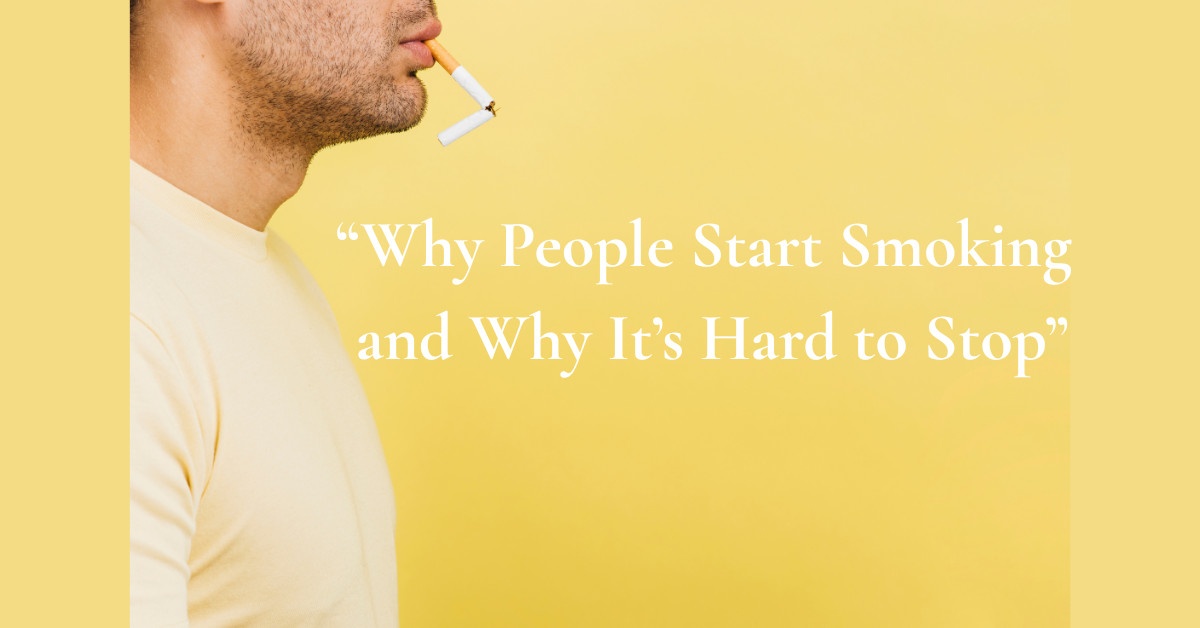Smoking is one of the most common habits globally — and quitting it is often far more difficult than most expect. To understand both why people begin smoking and why breaking free is such a struggle, we need to look at how addiction works, how routines are formed, and what tools can truly help someone stop. Let’s explore.
What Drives People to Start Smoking
- Peer Influence & Social Pressure: Many begin smoking due to social situations — friends, colleagues, or family members who smoke. In certain social circles or environments, lighting a cigarette can feel like a rite of belonging or acceptance.
- Cultural & Media Portrayals: Smoking has been glamorized in movies, television, advertisements, and sometimes even in music. The idea of being rebellious, sophisticated, or in control is often linked with cigarettes in popular culture.
- Stress Relief & Emotional Escape: Some people try cigarettes as a supposed escape from anxiety, tension, loneliness, or boredom. They believe smoking will calm nerves or offer a break during difficult times.
- Curiosity & Experimentation: Young people or those in transitional periods may try smoking just to experiment — to test boundaries or out of curiosity about how it feels. Curiosity about smoking often leads some people to try other substances like cannabis. For those struggling, our dedicated Marijuana Addiction Treatment in India programs provide safe and effective recovery options.
- Habit Formation via Repetition: What begins as an occasional cigarette can become a repeated behavior tied to daily routines — with coffee, after meals, during breaks — eventually becoming a ritual hard to break.
Why Quitting Smoking Is Difficult
Quitting isn’t just about deciding to stop. Several biological, psychological, and social factors combine to make quitting smoking a serious challenge.
1. Nicotine’s Powerful Hold
- Rapid brain effect: When a person inhales cigarette smoke, nicotine reaches the brain in seconds and triggers the release of dopamine — the “feel-good” chemical.
- Tolerance & dependency: Over time, the brain adjusts its chemistry to expect nicotine. Cravings increase, and without it, the body reacts strongly.
2. Withdrawal Symptoms
When nicotine levels drop, several uncomfortable symptoms appear: irritability, restlessness, difficulty focusing, anxiety, mood swings, insomnia, headaches. These symptoms often peak in the first few days and can linger for weeks.
3. Emotional & Ritual Triggers
- Smoking often becomes bound up with certain emotions — stress, sadness, celebration, boredom. Light up during or after meals, with tea or coffee, or during stressful moments.
- Environmental cues also trigger cravings: seeing someone smoke, certain locations, smells, even drinking alcohol. These associations become deeply rooted.
4. Mental Barriers & Self-Talk
- Thoughts like “Just one won’t matter,” or “I’ve smoked before and failed, so I’ll fail again,” sabotage quitting.
- Guilt or self-criticism after a slip can lead to giving up entirely (“abstinence violation effect”). Recognizing slips as part of the process helps reduce relapse.
5. Social & Cultural Reinforcement
- If people around you smoke — family, friends, coworkers — the behavior feels normal and even expected. This makes quitting feel isolating or unnatural.
- Cultural attitudes and norms can make tobacco use seem permissible or even stylish in certain settings. This adds pressure. For some, nicotine use can be a gateway to experimenting with harder substances like cocaine. In such cases, our specialized Cocaine Addiction Treatment in India helps individuals break free from dependency with medical and holistic care.
What Actually Helps When You Want to Quit
Quitting smoking is absolutely possible — what matters is combining strategies and getting support. Here are evidence-based methods:
|
Strategy
|
Why It Helps
|
|
Set a quit date & plan
|
Prepares you mentally: identify triggers, write motivations, map support systems.
|
|
Nicotine Replacement Therapy (NRT)
|
Patches, gums, lozenges reduce dependence and help with withdrawal.
|
|
Prescription medications
|
Some medicines reduce cravings by changing how the brain responds to nicotine.
|
|
Counseling & Behavioral Therapies
|
Techniques like Cognitive Behavioral Therapy (CBT) or Acceptance and Commitment Therapy (ACT) help manage emotions, reshape thoughts, and break rituals.
|
|
Mindfulness & urge surfing
|
Learning to observe cravings without giving in helps diminish their power.
|
|
Replacement habits & distractions
|
Chewing gum, walking, drinking water, breathing exercises — all help during craving moments.
|
|
Support groups or apps
|
Having emotional support, accountability, or tools to track progress significantly increases chances of success.
|
|
Celebrating milestones
|
Acknowledging achievements — no matter how small — builds confidence and positive reinforcement.
|
Progress Over Perfection
- It’s rare that someone quits smoking forever on the first attempt. That doesn’t mean failure — it means practice.
- Slips don’t negate effort; they help you learn what triggers relapse and what supports you need.
- Be kind to yourself: self-compassion helps reduce shame and improves resilience.
Why People Start Smoking and Why It’s So Hard to Stop: A Summary
From the first cigarette, social factors, emotional needs, curiosity, or cultural norms can push someone toward smoking. Once the habit starts, nicotine rewires the brain, emotional rituals strengthen it, and environmental cues keep it alive. Quitting means retraining both body and mind — a process that takes time, support, and kindness toward oneself.
If you or someone you know is struggling to stop smoking, you do not have to go through it alone. At Best Luxury Rehab in India, we offer tailored programs featuring medical guidance, therapy, and holistic support designed specifically for nicotine addiction. Reach out today to reclaim your health, overcome dependence, and start a lasting journey toward freedom.

DOCTOR MBBS, MD (PSYCHIATRY) Dr. Niharika Singh received her MBBS degree from Kurukshetra University, following which she went on to complete MD Psychiatry from Rajiv Gandhi University of Health Sciences, Bangalore.